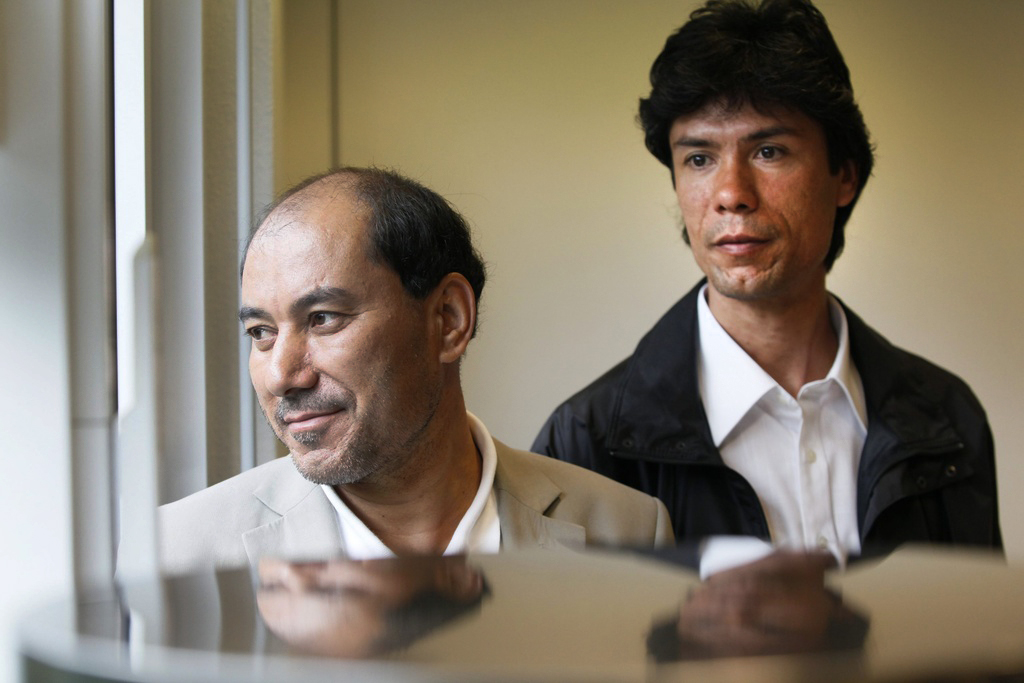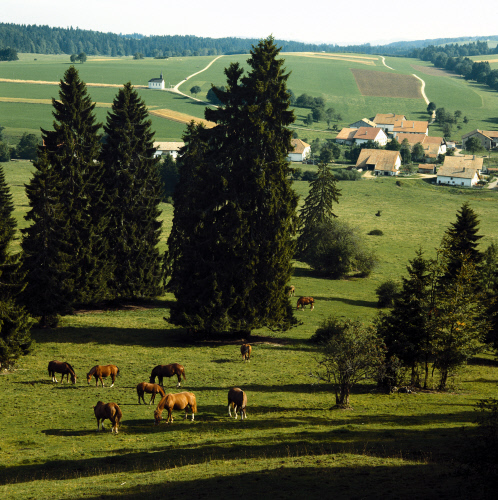Guantanamo Uighurs take steps towards integration

Six months after arriving in Switzerland, two Uighur former detainees of the Guantanamo Bay detention camp say they are happy in the country.
However, communication and getting used to another culture has presented the two brothers with challenges – as has living with the memories of Guantanamo.
Arkin and Bahtiyar Mahmut spent seven-and-a-half years in the United States-run prison, of which two were in solitary confinement, without being charged or convicted.
The men, who come from the Turkic-speaking Muslim Uighur people, who live mainly in China’s northwestern province of Xinjiang, have been living in the French-speaking Jura since March 23.
They were admitted to Switzerland on humanitarian grounds, to China’s disapproval.
Although they want to enjoy their freedom, the road is proving long and stony. Integration is mainly taking place through learning the language.
“They are attending a French course four times a week with other students. Furthermore, they have two weekly private lessons,” said Francis Charmillot, director of the Jura Migrant Welcome Association (AJAM), which is helping the brothers.
Their French is still shaky, so they are not yet able to have conversations. But they are able to live independently – shop and take the train – even if it has its price.
“They had to learn how to go shopping, use our products and manage their budget. Getting around by bicycle was also an achievement as they first had to become familiar with our system of road signs,” Charmillot told swissinfo.ch.
Support
Arkin and Bahtiyar have been able to count on the support of the Uighur community in Switzerland, which numbers around 80 people.
“We meet Arkin and Bahtiyar regularly and we have invited them to eat with us. The younger one, Bahtiyar, took part in the last Uighur community meeting in Bern,” said Endili Memetkerim, president of the Swiss Association of East Turkestan.
“They are pleased about being in Switzerland and they know they are among the privileged. The fate of the 20 other Uighur former Guantanamo detainees has not been so kind. The fact that they like it here contributes of course to their integration,” he added.
Of the other above-mentioned Uighurs, four are in Bermuda, five in Albania, six in Palau in the Pacific Ocean and five are still in Guantanamo waiting for asylum.
Integration differences
The brothers first shared an apartment but at the end of April they expressed a desire to live separately.
“It’s an absolutely legitimate demand for two adults [Arkin is 46, Bahtiyar 34]. Now they live two kilometres away from each other in Delémont and Courroux and meet up regularly,” Charmillot explained.
Bahtiyar, whose integration seems to be progressing faster than his brother’s, also embarked on a three-month work experience placement at the charity Caritas in Delémont, which was broken off because of linguistic problems.
“The aim, in addition to consolidating their French knowledge, is to find them work so they can become financially independent. But we have to remember that they’ve only been in Switzerland for six months,” added the AJAM director.
The men do not speak of their Guantanamo past much, except on rare occasions. “Recently we went out for a pizza and they said that Thursday was pizza day in Guantanamo,” said Charmillot.
“Bahtiyar wants to leave this terrible chapter of his life behind. Arkin, however, finds the prison experience much more difficult.”
Confidence problems
This has also had an impact on the brothers’ confidence. “They are insecure and are also asking if what they have done or are doing is all right. They are reassured all the time. These are deep wounds which will perhaps heal over time,” added Charmillot.
Arkin and Bahtiyar are having counselling from AJAM experts. The International Committee of the Red Cross (ICRC) is also involved in helping the Uighurs.
“It is important for the former detainees that the ICRC ensures a continuity with the work started at Guantanamo,” spokesman Christian Cardon told swissinfo.ch.
“They are happy for our delegate to accompany them in the host country. The ICRC also acts as intermediary between them and their relatives.”
Despite wanting to integrate into Switzerland, the men still cherish the hope of one day seeing their homeland – as does Memetkerim.
“We expect to return and this day will come,” Memetkerim said.
The trial of Ahmed Khalfan Ghailani, the first detainee to be transferred from the US military prison at Guantanamo Bay to the civilian courts system, was scheduled to begin on Wednesday in New York but has now been postponed until October 12.
Ghailani, a Tanzanian, is accused of supplying some of the explosives in the 1998 US embassy bombings in Tanzania and Kenya, coordinated by al-Qaida, in which 224 people died.
Whereas other detainees have been tried by military commissions, Ghailani is the first Guantanamo prisoner to be tried in the civilian courts.
The case is seen as a test of the Obama administration’s pledge to close the US military base in Cuba by next January.
According to Amnesty International, 67 ex-detainees have left Guantanamo during President Obama’s tenure. Switzerland has also accepted an Uzbek man who lives in canton Geneva, but his privacy is being kept under wraps. An official told swissinfo.ch that his integration was continuing in a “normal way”.
The Uighurs are a Turkic-speaking Muslim people, who live mainly in China’s northwestern province of Xinjiang. This area has been an autonomous region since 1995.
The area, which the Uighurs still call East Turkestan, is not only energy-rich but also strategically located in Central Asia. It makes up a sixth of Chinese territory.
In recent years there has been unrest in the area, blamed by Beijing on separatists and “terrorists”. Rights groups and exiles say the unrest has been sparked by Chinese attempts to suppress Uighur religious and cultural rights.
Other critics say ethnic tension has been stoked by inequalities in the benefits arising from central government investments in the region.
There are 21 million people in the region, of which 60 per cent live in the countryside. Uighurs make up 45 per cent according to figures from 2004.
(Adapted from Italian by Isobel Leybold-Johnson)

In compliance with the JTI standards
More: SWI swissinfo.ch certified by the Journalism Trust Initiative













You can find an overview of ongoing debates with our journalists here . Please join us!
If you want to start a conversation about a topic raised in this article or want to report factual errors, email us at english@swissinfo.ch.